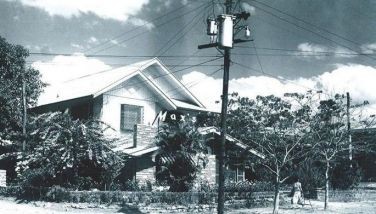Our 2010 outlook
Last week, we said that we had to review what transpired during the past two years in order to understand what will happen going forward. We enumerated our calls and predictions in chronological order. Below we summarize our major thesis for our outlook in 2010:
• In 2008, we’ve experienced that financial version of “Armageddon.” Similar to what we experienced during the Asian crisis, the financial system went through a near-death experience after Lehman Brothers collapsed. Only this time it was to be on a global scale and encompassed all asset markets.
• We’ve had the biggest decline in the markets in 2008. Therefore, the spectacular bounce in 2009 is but a natural move. This is similar to Newton’s Third Law of Motion which states that “for every action, there is an equal and opposite reaction.” The benchmark S&P 500 index, for example, declined 57 percent from its October 2007 peak of 1,575 to its March 2009 low of 666. The index has since rebounded 70 percent from that low.
• The bear market is over and the bull market remains intact. Technically speaking, the bullish trend confirmation that occurred in 2009 remains intact. As with all bull markets, we will continue to experience bumps and corrections along the way. Nonetheless, we will remain bullish until the long-term trend says otherwise.
• Government is all-out to reinvigorate the economy. We are fortunate to have Ben Bernanke at the helm of the Fed. He knows what to do during a deflationary crisis, being a keen student of liquidity traps during the 1930s Great Depression and 1990s Lost Decade of Japan. Worldwide, the fiscal and monetary policies of governments remain ultra-stimulative. Such an environment is positive for stocks, at least until policymakers shift into a tightening stance.
• The US economy on the road to recovery. Recent data in the US shows that GDP likely grew five percent in the 4th quarter of 2009. As the economy continues to improve, US job losses have moderated to an average monthly loss of 69,000 in the 4th quarter of 2009 compared to 200,000 in the 3rd quarter and 400,000 in the 2nd quarter of last year. Given this trend, we may already see an up-tick in the employment figure sometime during this 1st quarter of 2010.
• Asia is leading the growth. Having weathered a similar financial crisis in the late 1990s, Asia is recovering faster than the West. Most Asian countries had well-managed fiscal positions, underleveraged private sectors and huge currency reserve buffers to deal with external shocks. In addition, the region was spared of the toxic assets that plagued US and Europe. That is why the recovery was faster. In fact, IMF sees Asia growing by 5.75 percent this year, far higher than the 1.25-percent growth expected for the G-7 economies.
• Corporate earnings on a rebound. Consensus estimates (by Zack’s Investment Research) show a 27-percent rise in earnings for S&P 500 companies in 2010. In the case of Philippine companies that we track in our basket, we expect a 17.6-percent earnings growth in 2010.
S&P 500 & PSEi targets
Unlike 2009, we expect a bumpy road for stocks in 2010. We would not be surprised to see volatility increasing and more corrections happening, particularly given the strong advance in stocks over the past nine months. At the end of the year, however, we expect the markets to be modestly higher.
In the case of the S&P 500, we expect it to reach 1,250 in 2010 before it encounters a major resistance. At 1,250, the S&P 500 would be trading at a price-to-earnings ratio of 15.6x.
Meanwhile, we expect the PSE Index to reach 3,300 in 2010 before it comes across a more serious impediment. At 3,300, the PSE Index would be trading at a price-to-earnings ratio of 14.6x.
Risks to our forecasts
Despite the seemingly favorable economics and earnings backdrop, we suggest that investors be more cautious in managing their portfolio because of the possible risks that may cause substantial corrections:
1) Policymakers may increase interest rates and remove stimulus programs prematurely.
2) Government becomes more interventionist, e.g. putting position limits in some agricultural commodities and energy products.
3) Higher taxes and introduction of new ones like the proposed “bank tax” in the US.
4) More unforeseen shocks like the insolvency of Dubai World and the credit downgrade of Greece.
5) Earnings disappointments because expectations may already be too high like the case of JP Morgan and Alcoa.
In the short run, government interventions in the commodities markets and the higher taxes would be negative for stocks. In the long-run, however, both moves are viewed to have positive effects. Putting position limits on commodity trading will lessen future volatility in commodity prices. Meanwhile, higher taxes would address the debt and deficit problems of the government.
Corrections in 2010 will happen. But as to the timing, depth and the reasons for the corrections, nobody really knows. What is important is that the markets have made an important low in March 2009 and that the general trend is now upwards. Therefore, substantial pullbacks or corrections from hereon are opportunities to buy.
For comments and inquiries, you can email us at info@philequity.net. You can also view our archived articles at www.philequity.net or www.wealthsec.com.
- Latest
- Trending































